(CNN) -- When Egypt's first democratically elected president was tossed out this year, the White House stopped short of calling it a coup.
Doing so would have forced an end to the $1.3 billion that the United States sends in military aid every year -- and changed the course of its relationship with its strongest Arab ally in the region.
But that was before Wednesday, when the military-led interim government stormed two camps full of former President Mohamed Morsy's supporters. More than 525 people were killed and 3,717 wounded in the bloodiest day in Egypt's recent history, officials there said.
On Thursday, President Barack Obama condemned the violence against civilians and announced the United States is canceling next month's joint U.S.-Egyptian military exercises.
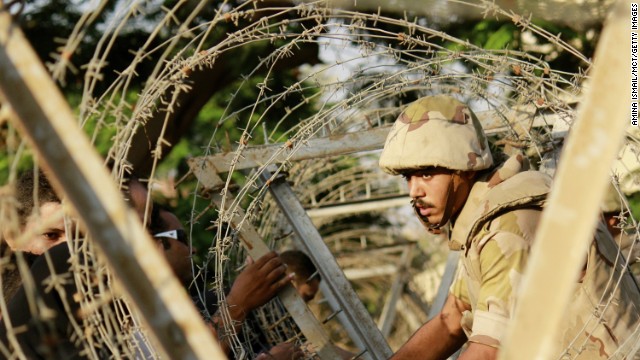 A soldier sets up barbed wire in anticipation of protesters outside the constitutional court in Cairo on Sunday, August 18. The protesters never showed up. Over the past week, about 900 people -- security forces as well as citizens -- have been killed. Deaths occurred when the military used force to clear supporters of ousted President Mohamed Morsy from two sit-in sites in Cairo on Wednesday, and violence raged after Morsy supporters staged demonstrations Friday. Look back at Egypt's unrest.
A soldier sets up barbed wire in anticipation of protesters outside the constitutional court in Cairo on Sunday, August 18. The protesters never showed up. Over the past week, about 900 people -- security forces as well as citizens -- have been killed. Deaths occurred when the military used force to clear supporters of ousted President Mohamed Morsy from two sit-in sites in Cairo on Wednesday, and violence raged after Morsy supporters staged demonstrations Friday. Look back at Egypt's unrest.  Photos: Egypt protests
Photos: Egypt protests 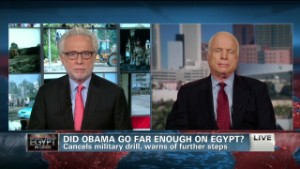 Sen. McCain: 'A blow to our credibility'
Sen. McCain: 'A blow to our credibility' 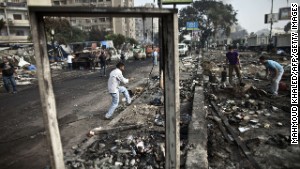 Why hasn't the U.S. cut aid to Egypt?
Why hasn't the U.S. cut aid to Egypt? But will the carnage in Egypt spur more changes in U.S. policy toward the most populous Arab country? And might the hardening U.S. stance affect Egypt's own approach?
The short answer: We'll have to wait and see.
Mom's desperate text to daughter killed in Egypt
'A hornets' nest'
The United States helps Egypt in part because it's one of only two Arab countries -- along with Jordan -- that made peace with Israel.
In return, Egypt gets more than $1 billion each year in U.S. taxpayer money for military and civilian programs. No other country except Israel gets more.
That aid buys Washington an ally to depend on in a turbulent region.
The U.S. doesn't want to upset that balance. And pulling aid might do so.
"It's a hornets' nest. And that's why the administration is trying not to stir it too much," CNN's Fareed Zakaria said.
What experts say about the bloodshed in Cairo
Give up some to get some
But it's not just the peace process and regional stability that the United States is interested in.
Egypt controls the Suez Canal, a crucial sea route used by more than 4% of the world's oil traffic and 8% of all seaborne trade. So far, the canal is running smoothly. But a disruption there could end up hitting Americans in the pocketbook, not to mention affect the safe passage of U.S. military ships and equipment.
Then there's business for American companies, intelligence cooperation -- and the military relationship.
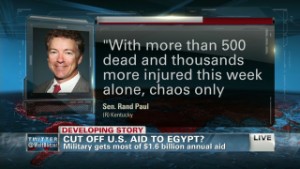 Should the U.S. cut off aid to Egypt?
Should the U.S. cut off aid to Egypt? 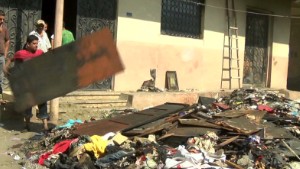 Egypt's churches looted and torched
Egypt's churches looted and torched 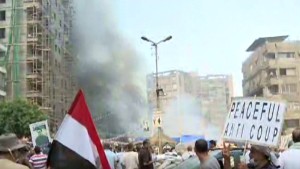 U.S. watching Egypt chaos carefully
U.S. watching Egypt chaos carefully "The reality is that the Egyptian military has not only been a source of stability for the United States in an otherwise turbulent Middle East, but it has also been a cash cow," said Khairi Abaza, a senior fellow at the Foundation for Defense of Democracies.
"Currently, the Egyptian military relies on U.S. military equipment, training and services. This reliance means that Egypt is essentially a client of the U.S. military complex, and aid money is in fact re-injected back into the U.S. economy."
World urges Egypt to show restraint
All of the factors are enough to give the U.S. pause.
"We need to have a discussion about the costs and benefits of different relationships with the Egyptians, and the Egyptians need to have the same about their relationship with us," said Jon Alterman, director of the Middle East Program at the Center for Strategic and International Studies.
"If you want a different relationship, you have to articulate what that looks like, and accept you are going to have to give up some things to get other things."
'A really tough dilemma'
From the Obama administration's side, it's an "incredibly complex and difficult situation" that will require more time to figure out.
That's what White House spokesman Jay Carney said in July soon after Morsy was ousted, and reporters pressed him as to why the administration wasn't calling it a coup.
"It would not be in the best interests of the United States to immediately change our assistance programs" to Egypt, Carney said at the time.
Middle East analyst Robin Wright with the Wilson Center says the core issue is what our policy ought to be.
"The United States faces a really tough dilemma now," she said. "What to do about the most important country in the Arab world, the cornerstone of the peace process, a country that has received over $30 billion in U.S. aid since the peace process began in the late 1970s."
Cameraman killed in Cairo violence
Calls mounting
Some in Congress, including Republican Sen. John McCain of Arizona, already have called for halting the aid, saying the United States "should not be supporting this coup." McCain traveled to Egypt on August 5 along with Sen. Lindsey Graham of South Carolina. Both held meetings with representatives of the interim government and the Muslim Brotherhood.
Democratic Sen. Robert Menendez of New Jersey, chairman of the Senate Foreign Relations Committee, has said the United States hasn't committed much of this year's aid -- and that's a good thing.
"This is an opportunity to have a pause and say to the Egyptians, 'You have an opportunity to come together,' " he said. "You have to have the military understand that that's what we're looking for, a transition right away, as soon as possible."
Three choices
According to senior U.S. officials last month, the administration is examining three potential options:
-- Call it a coup and cut off aid.
-- Call it a coup and issue a national security waiver to allow aid to continue.
-- Don't call it a coup because the Egyptian military has taken steps to move the country toward a civilian transitional government and subsequent elections.
Now, officials -- both current and former -- recognize the climate is not encouraging.
'Time to call it a coup'
"I think it is time to call it a coup. I think it was time six weeks ago," former Assistant Secretary of State P.J. Crowley said Wednesday.
"Suspend military assistance so the military is invested in the process of rewriting the constitution, setting the parliament and electing a new president."
Secretary of State John Kerry said Wednesday that while a political solution is still possible, "it has been made much, much harder, much more complicated."
"The path toward violence leads only to greater instability, economic disaster and suffering," Kerry said
He also called for an end to Egypt's new state of emergency, which prevents freedom of peaceful assembly and due process.
U.S. still considering its strategy
But as far as firm actions, the United States' game plan has yet to be drawn.
The Pentagon is mulling whether to halt or delay arms exports.
But as leaders in Washington mull their options, Americans overwhelmingly support staying out of the unrest, according to a recent United Technologies/National Journal Congressional Connection Poll.
Almost eight in 10 Americans (78%) said the United States should "mostly stay out of events" in Egypt, according to the poll. But 16% said the U.S. should "do more" to end the violence.
The desire to stay out of Egypt's affairs might be connected to the fact that a majority of Americans feel what happens in the country isn't very important to U.S. interests.
According to a Pew Research Center poll, 61% of Americans say what happens in Egypt is somewhat important or not important, while 36% say it is very important.
But ultimately, it's up to Egyptians to find a peaceful resolution between the military-backed interim government and those who want Morsy back.
"The role the United States had tried to play as mediator between the military and the Muslim Brotherhood to try to find some kind of compromise is now moot," said Wright, the Middle East analyst. "There's not much the United States can do."
This article is taken from CNN.com
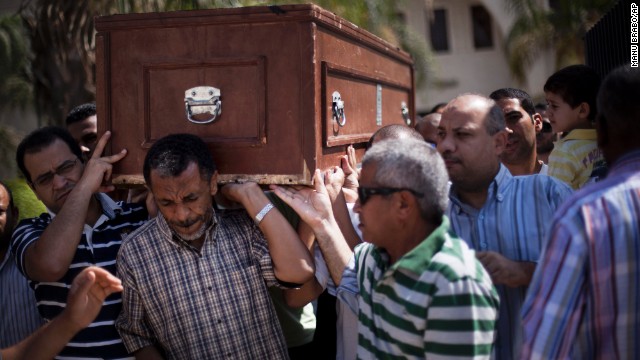 Friends and relatives of Ammar Badie, 38, killed Friday during clashes in Ramses Square, carry his coffin during his funeral in Al-Hamed mosque in Cairo on August 18. Ammar Badie was the son of the Muslim Brotherhood's spiritual leader, Mohammed Badie.
Friends and relatives of Ammar Badie, 38, killed Friday during clashes in Ramses Square, carry his coffin during his funeral in Al-Hamed mosque in Cairo on August 18. Ammar Badie was the son of the Muslim Brotherhood's spiritual leader, Mohammed Badie. 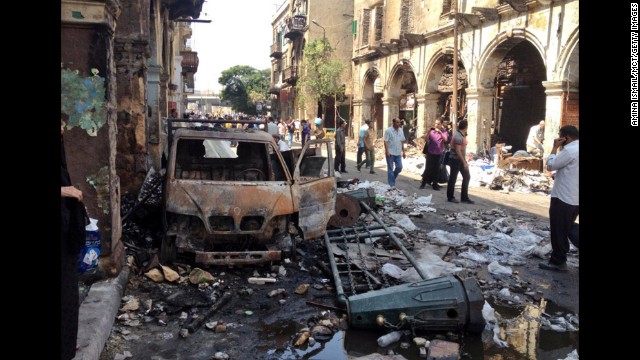 Wreckage and debris litter the area around the Al-Fateh mosque in Cairo, where hundreds of Islamist protesters had barricaded themselves on Saturday, August 17. Thousands defied an emergency order by taking to the streets the day before to mark a "Friday of anger" in support of ousted President Mohamed Morsy.
Wreckage and debris litter the area around the Al-Fateh mosque in Cairo, where hundreds of Islamist protesters had barricaded themselves on Saturday, August 17. Thousands defied an emergency order by taking to the streets the day before to mark a "Friday of anger" in support of ousted President Mohamed Morsy.  Riot police enter the community services hall of the Al-Fateh mosque, where Morsy supporters had holed up on August 17.
Riot police enter the community services hall of the Al-Fateh mosque, where Morsy supporters had holed up on August 17.  Policemen stand guard inside a room of Al-Fateh mosque as supporters of Morsy exchange gunfire with security forces inside the mosque in Cairo on Saturday, August 17.
Policemen stand guard inside a room of Al-Fateh mosque as supporters of Morsy exchange gunfire with security forces inside the mosque in Cairo on Saturday, August 17. 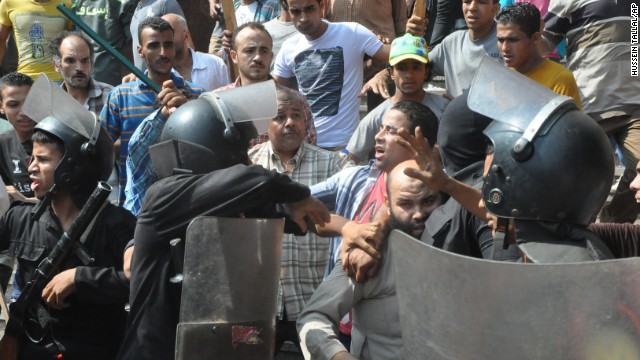 Egyptians security forces escort a supporter of the Muslim Brotherhood out of the Al-Fateh mosque and through an angry crowd in Ramses Square on August 17.
Egyptians security forces escort a supporter of the Muslim Brotherhood out of the Al-Fateh mosque and through an angry crowd in Ramses Square on August 17.  An army officer escorts an Islamist woman out of Cairo's Al-Fateh mosque on August 17.
An army officer escorts an Islamist woman out of Cairo's Al-Fateh mosque on August 17.  A Morsy supporter prays on the floor of the Al-Fateh mosque in Ramses Square as injured protesters are treated nearby on Friday, August 16.
A Morsy supporter prays on the floor of the Al-Fateh mosque in Ramses Square as injured protesters are treated nearby on Friday, August 16. 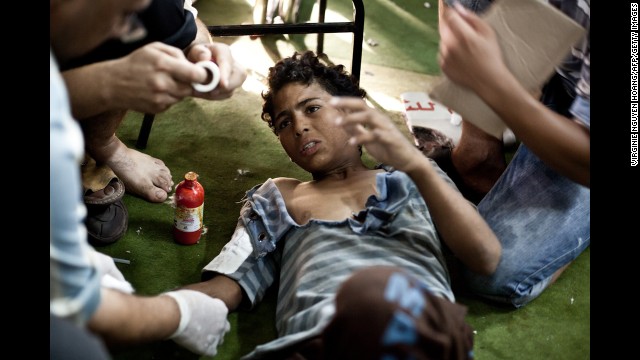 A wounded boy is treated in the Taamin Sehi field hospital during clashes on August 16.
A wounded boy is treated in the Taamin Sehi field hospital during clashes on August 16. 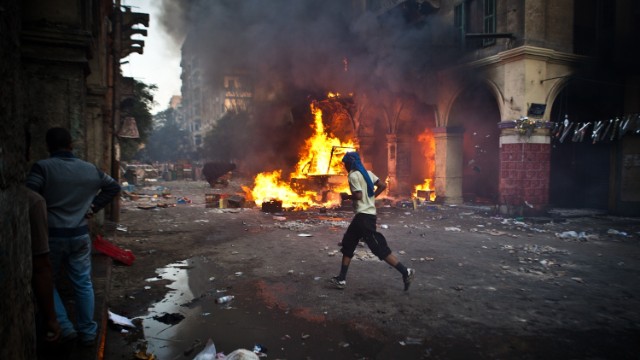 A supporter of the Muslim Brotherhood runs past a burning vehicle near Cairo's Ramses Square during clashes with security officers on August 16.
A supporter of the Muslim Brotherhood runs past a burning vehicle near Cairo's Ramses Square during clashes with security officers on August 16. 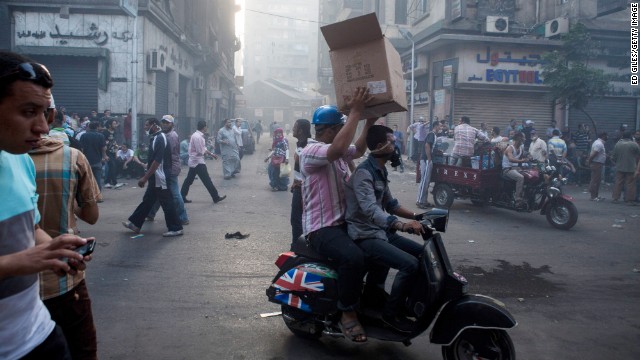 Morsy supporters carry supplies while violent clashes continue to take place near Ramses Square on August 16.
Morsy supporters carry supplies while violent clashes continue to take place near Ramses Square on August 16.  An Egyptian man offers a bottle of juice to policemen as clashes between Morsy supporters and security forces continue in Cairo on August 16.
An Egyptian man offers a bottle of juice to policemen as clashes between Morsy supporters and security forces continue in Cairo on August 16. 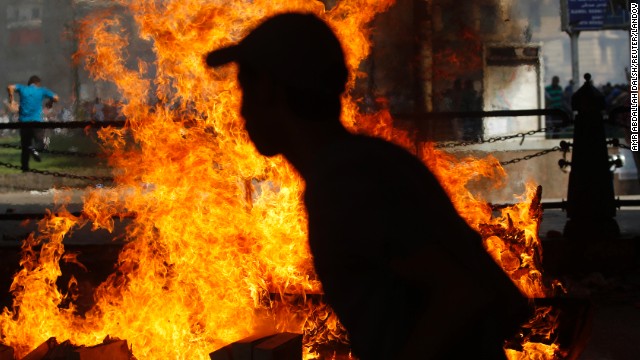 Members of the Muslim Brotherhood and Morsy supporters flee shooting near Ramses Square in Cairo on August 16.
Members of the Muslim Brotherhood and Morsy supporters flee shooting near Ramses Square in Cairo on August 16.  A Muslim Brotherhood member and Morsy supporter wears a gas mask made out of a plastic bottle during clashes in front of the Azbkya police station on August 16.
A Muslim Brotherhood member and Morsy supporter wears a gas mask made out of a plastic bottle during clashes in front of the Azbkya police station on August 16. 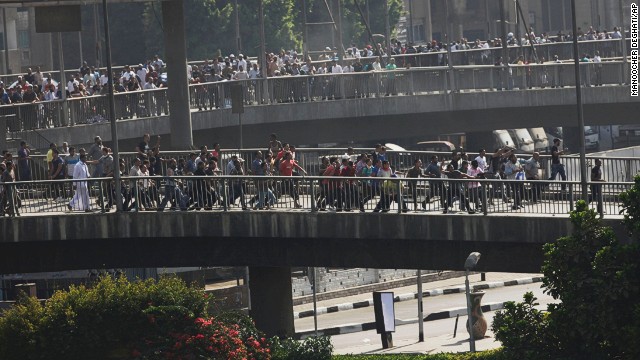 Morsy supporters march in Cairo. Gunfire was heard from the overpass as tear gas was fired.
Morsy supporters march in Cairo. Gunfire was heard from the overpass as tear gas was fired. 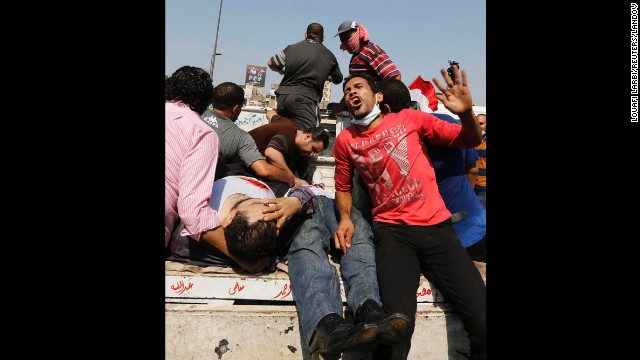 Demonstrators hurt in the clashes at Ramses Square are taken away on August 16 in Cairo.
Demonstrators hurt in the clashes at Ramses Square are taken away on August 16 in Cairo.  A military helicopter flies above demonstrators in Cairo on August 16.
A military helicopter flies above demonstrators in Cairo on August 16. 
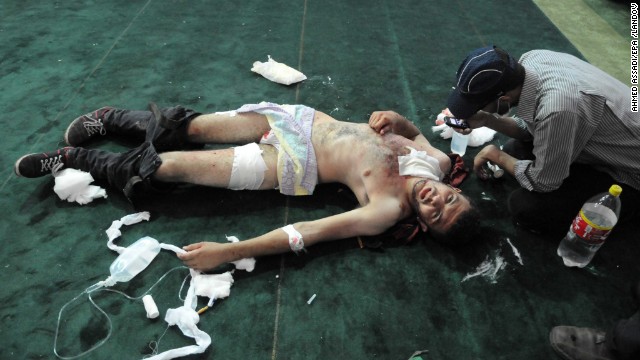 A protester receives treatment at the Al-Fateh mosque in Cairo on August 16.
A protester receives treatment at the Al-Fateh mosque in Cairo on August 16. 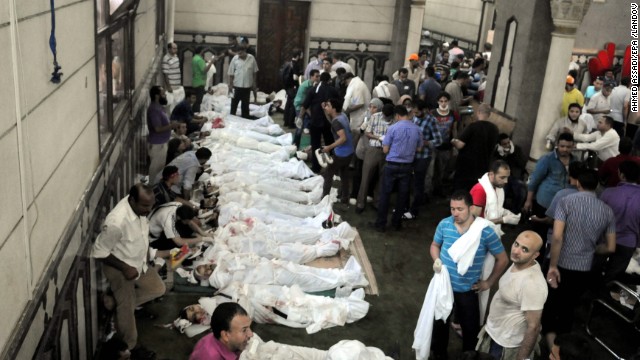 Bodies of protesters who died during clashes are laid out at the Al-Fateh mosque on August 16.
Bodies of protesters who died during clashes are laid out at the Al-Fateh mosque on August 16. 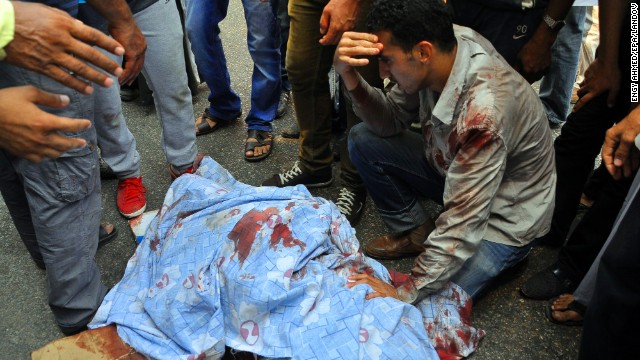 A group of men gather around an injured protester in Giza on August 16.
A group of men gather around an injured protester in Giza on August 16.  Demonstrators and Muslim Brotherhood supporters carry the body of a man apparently shot during clashes with security forces in Giza district on the outskirts of Cairo on August 16.
Demonstrators and Muslim Brotherhood supporters carry the body of a man apparently shot during clashes with security forces in Giza district on the outskirts of Cairo on August 16. 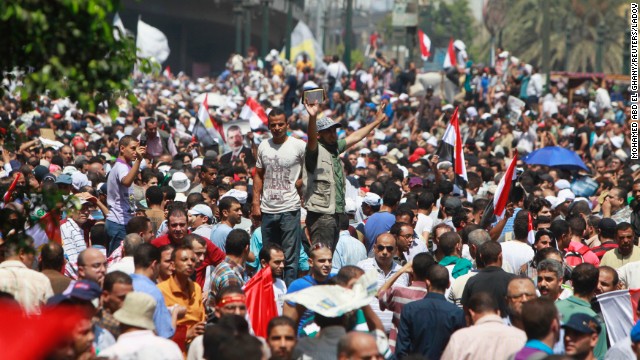 Morsy supporters demonstrate outside Al-Fateh mosque in Ramses Square in Cairo on August 16.
Morsy supporters demonstrate outside Al-Fateh mosque in Ramses Square in Cairo on August 16. 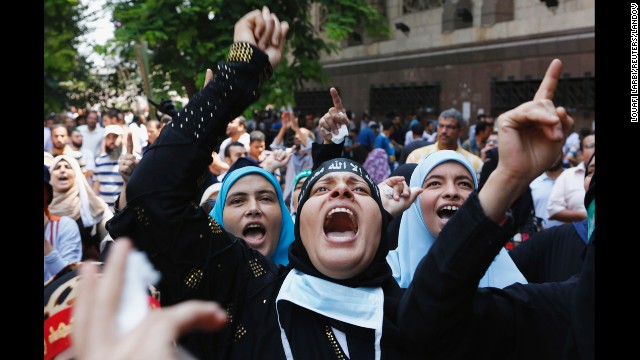 Protesters demonstrate near Ennour mosque in Cairo on August 16.
Protesters demonstrate near Ennour mosque in Cairo on August 16. 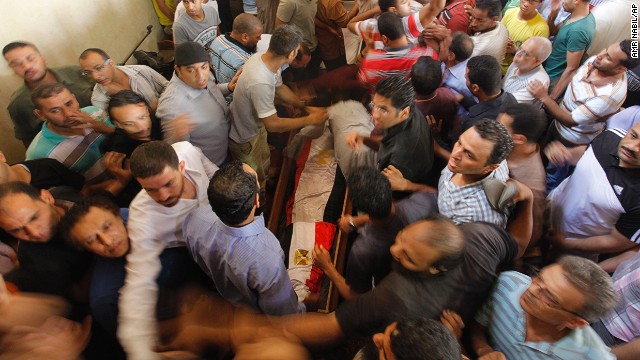 A flag-covered coffin of a man killed during Wednesday's clashes is carried at Amr Ibn Al-As mosque before a funeral in Cairo on August 16.
A flag-covered coffin of a man killed during Wednesday's clashes is carried at Amr Ibn Al-As mosque before a funeral in Cairo on August 16.  A protester wounded during clashes braces for help outside of a church on Mourad Street in Giza on August 16.
A protester wounded during clashes braces for help outside of a church on Mourad Street in Giza on August 16. 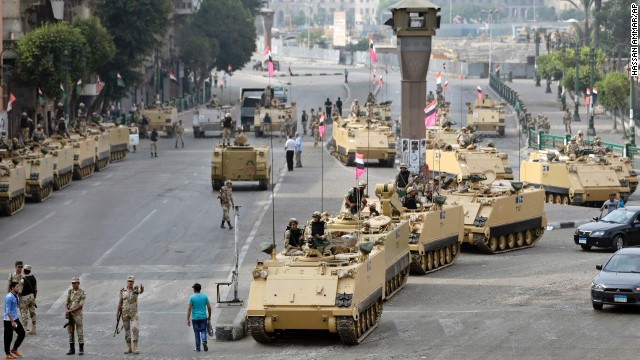 Egyptian soldiers take positions alongside armored vehicles as they guard the entrance to Tahrir Square in Cairo on Friday, August 16.
Egyptian soldiers take positions alongside armored vehicles as they guard the entrance to Tahrir Square in Cairo on Friday, August 16. 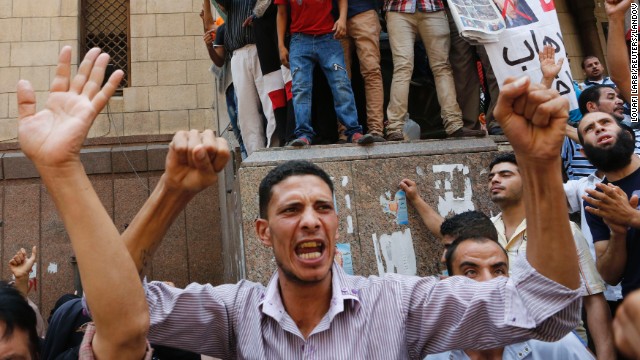 A Morsy supporter takes part in a protest near Ennour mosque in Cairo on August 16.
A Morsy supporter takes part in a protest near Ennour mosque in Cairo on August 16. 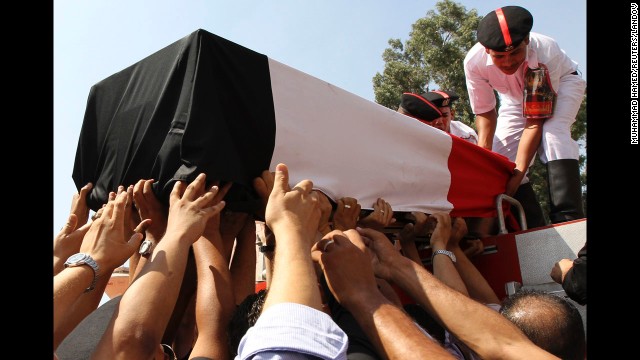 People reach for a coffin on Thursday, August 15, during a funeral for police officers killed during a crackdown at two protest camps in support of Morsy.
People reach for a coffin on Thursday, August 15, during a funeral for police officers killed during a crackdown at two protest camps in support of Morsy. 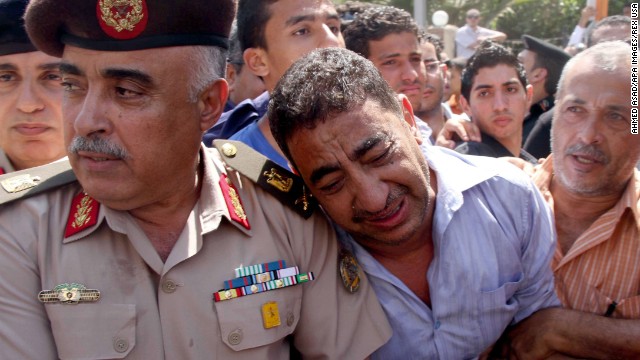 Egyptian police officers attend the funeral for their colleagues on August 15.
Egyptian police officers attend the funeral for their colleagues on August 15. 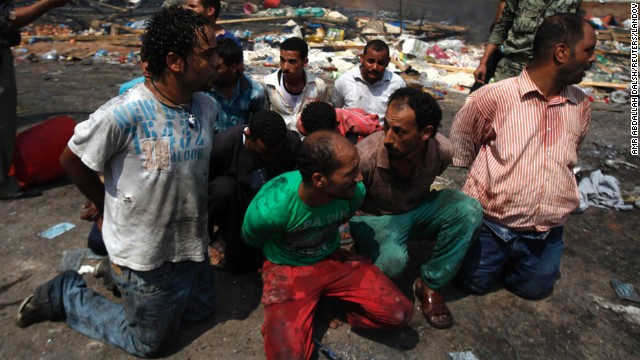 Men are detained near a burned section of Rabaa Al-Adawiya mosque in Cairo on August 15.
Men are detained near a burned section of Rabaa Al-Adawiya mosque in Cairo on August 15. 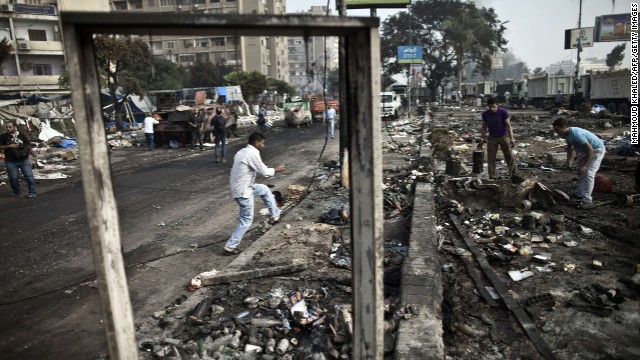 People search through debris at Rabaa al-Adawiya Square on August 15.
People search through debris at Rabaa al-Adawiya Square on August 15. 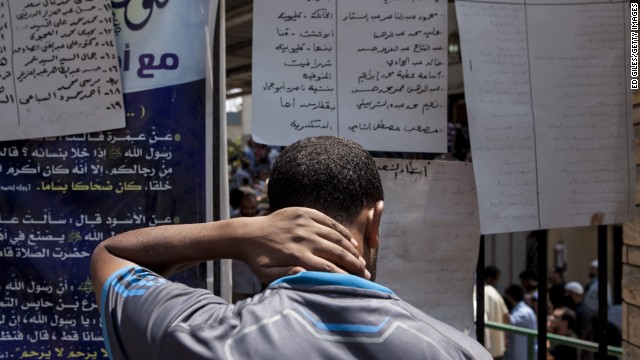 A man on August 15 checks out a list of names of those killed in the crackdown.
A man on August 15 checks out a list of names of those killed in the crackdown. 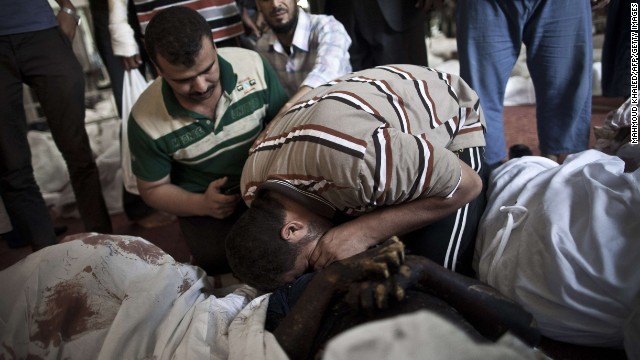 Egyptians mourn over a body wrapped in shrouds at a Cairo mosque August 15.
Egyptians mourn over a body wrapped in shrouds at a Cairo mosque August 15. 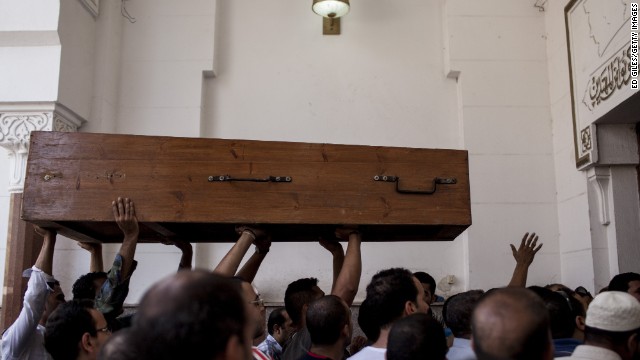 Morsy supporters carry a coffin into a mosque in Cairo's Nasr City on August 15.
Morsy supporters carry a coffin into a mosque in Cairo's Nasr City on August 15. 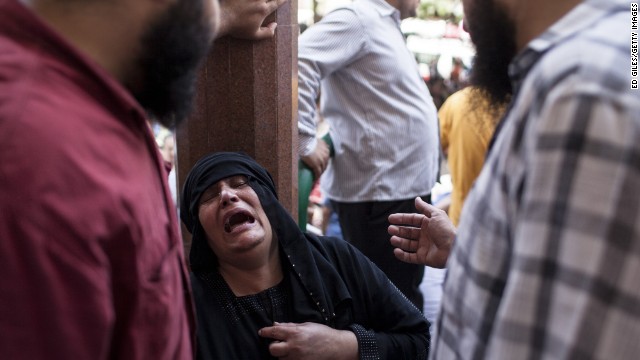 A woman weeps after identifying the body of a relative on August 15 at a Cairo mosque.
A woman weeps after identifying the body of a relative on August 15 at a Cairo mosque. 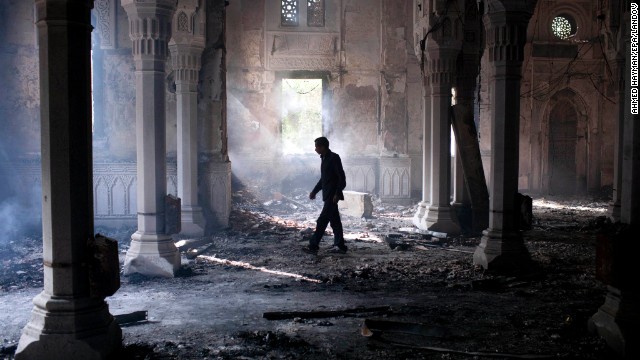 A man walks inside the burned-out Rabaa Al-Adawiya mosque in Cairo on August 15.
A man walks inside the burned-out Rabaa Al-Adawiya mosque in Cairo on August 15. 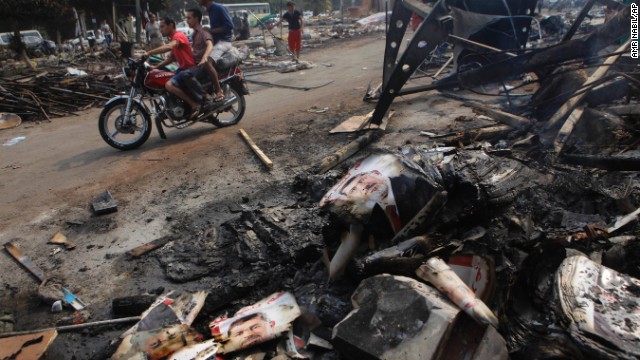 Motorcyclists pass by debris, including Morsy posters, in Cairo's Nahda Square on August 15.
Motorcyclists pass by debris, including Morsy posters, in Cairo's Nahda Square on August 15. 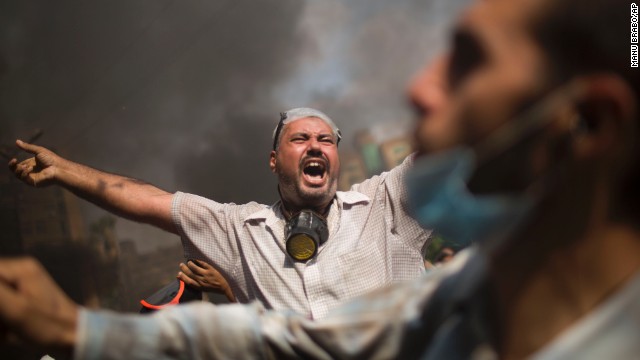 Supporters of Morsy shout during clashes with Egyptian police at the Rabaah Al-Adawiya protest camp in Cairo's Nasr City district on August 14.
Supporters of Morsy shout during clashes with Egyptian police at the Rabaah Al-Adawiya protest camp in Cairo's Nasr City district on August 14. 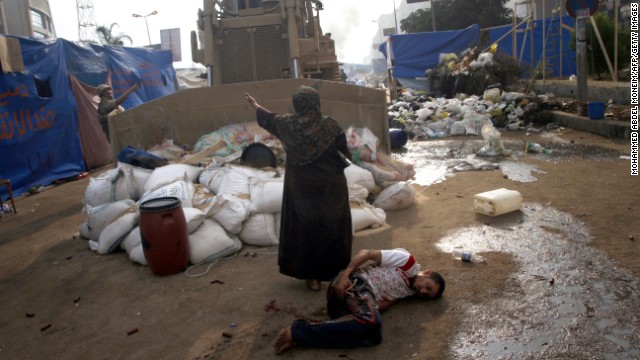 A woman tries to stop a military bulldozer from hurting a wounded youth during clashes on August 14 in eastern Cairo.
A woman tries to stop a military bulldozer from hurting a wounded youth during clashes on August 14 in eastern Cairo. 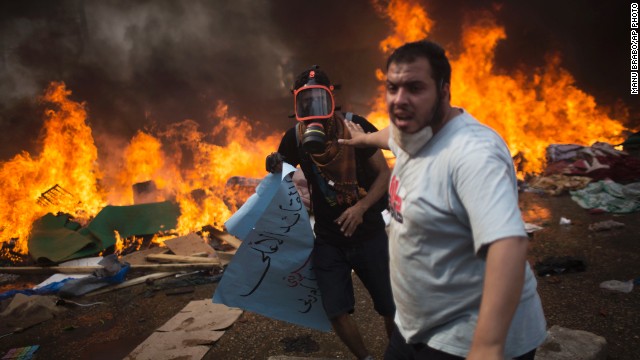 Morsy supporters run as Egyptian security forces fire toward them on August 14.
Morsy supporters run as Egyptian security forces fire toward them on August 14. 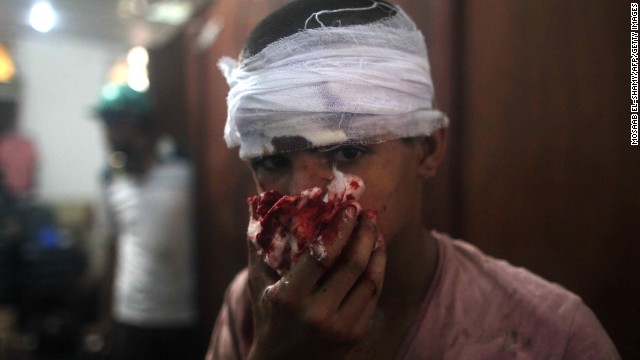 An injured youth is seen at a makeshift hospital in Cairo on August 14.
An injured youth is seen at a makeshift hospital in Cairo on August 14. 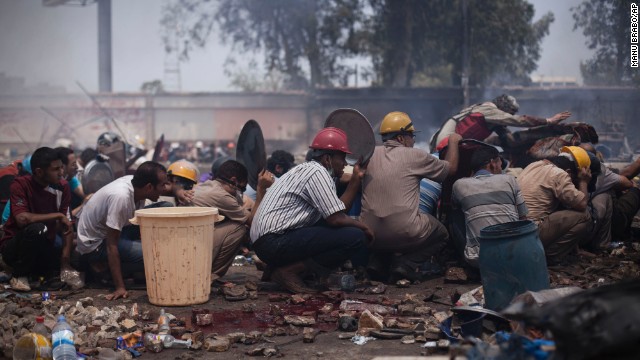 Supporters of Morsy take cover from Egyptian security forces during clashes on August 14.
Supporters of Morsy take cover from Egyptian security forces during clashes on August 14. 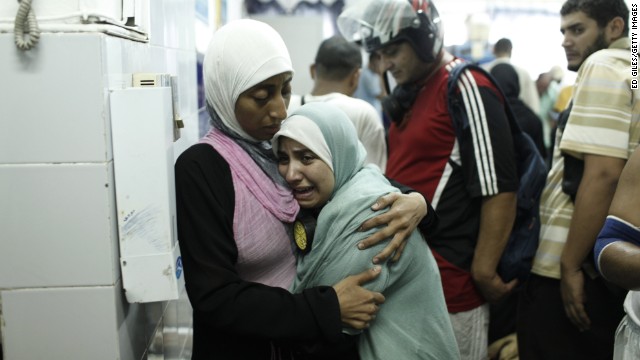 A Morsy supporter reacts after identifying the body of a dead family member at the Rabaa al-Adawiya Medical Center on August 14 in Cairo.
A Morsy supporter reacts after identifying the body of a dead family member at the Rabaa al-Adawiya Medical Center on August 14 in Cairo. 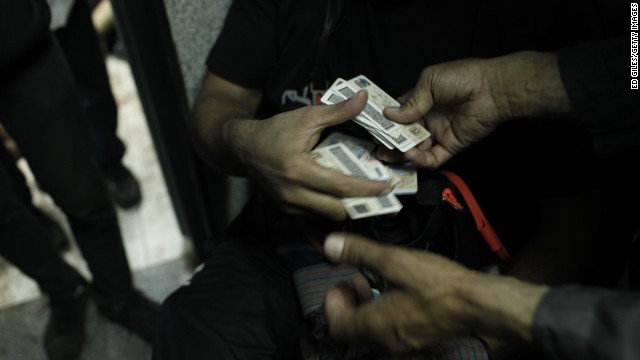 The national identity cards of protesters allegedly killed during a clear-out operation by Egyptian security forces on pro-Morsy demonstrators are exchanged at the Rabaa al-Adawiya Medical Center on August 14.
The national identity cards of protesters allegedly killed during a clear-out operation by Egyptian security forces on pro-Morsy demonstrators are exchanged at the Rabaa al-Adawiya Medical Center on August 14. 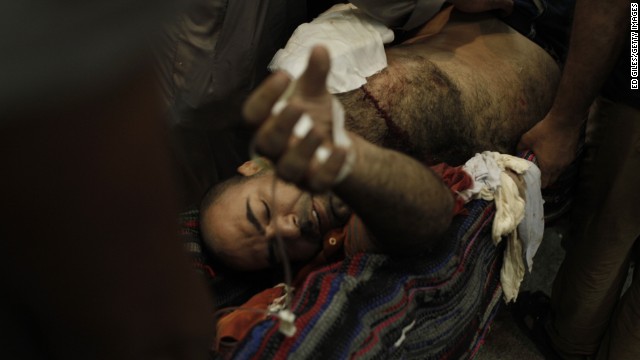 A Morsy supporter lies wounded on a stretcher at the Rabaa al-Adawiya Medical Center on August 14.
A Morsy supporter lies wounded on a stretcher at the Rabaa al-Adawiya Medical Center on August 14. 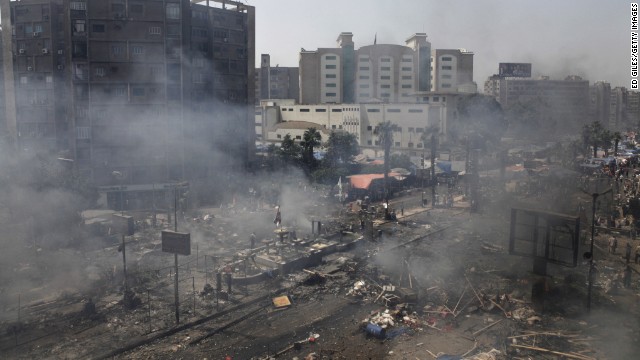 Plumes of smoke rise from the site of a protest in support of deposed President Morsy in Cairo on August 14.
Plumes of smoke rise from the site of a protest in support of deposed President Morsy in Cairo on August 14. 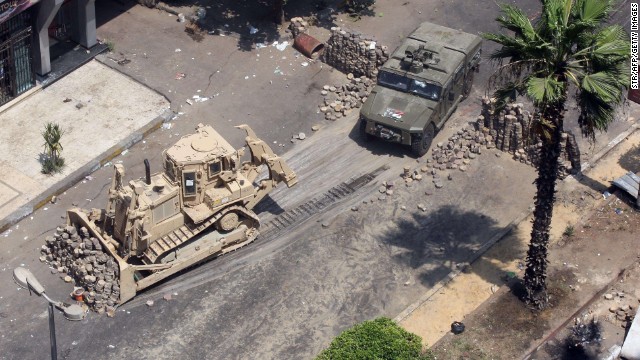 Army bulldozers remove a barricade erected by supporters of Morsy during clashes with riot police at Cairo's Mustafa Mahmoud Square on August 14.
Army bulldozers remove a barricade erected by supporters of Morsy during clashes with riot police at Cairo's Mustafa Mahmoud Square on August 14. 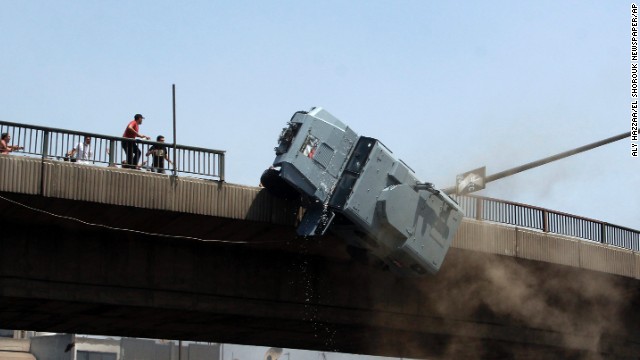 Supporters of Morsy push a police vehicle off the 6th of October Bridge in Cairo on August 14.
Supporters of Morsy push a police vehicle off the 6th of October Bridge in Cairo on August 14. 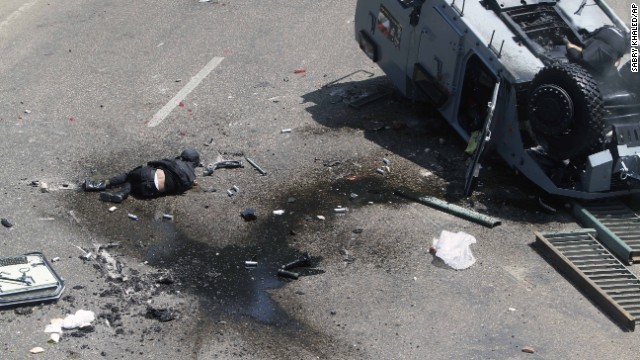 A member of the Egyptian security forces lies on the ground in Cairo on August 14 after a police vehicle was pushed off the 6th of October Bridge.
A member of the Egyptian security forces lies on the ground in Cairo on August 14 after a police vehicle was pushed off the 6th of October Bridge. 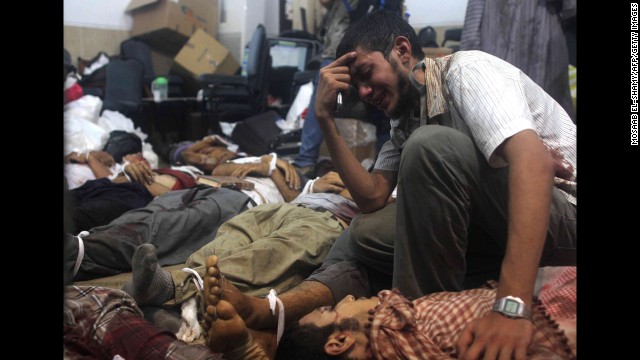 A man grieves at a makeshift morgue in Cairo on August 14.
A man grieves at a makeshift morgue in Cairo on August 14. 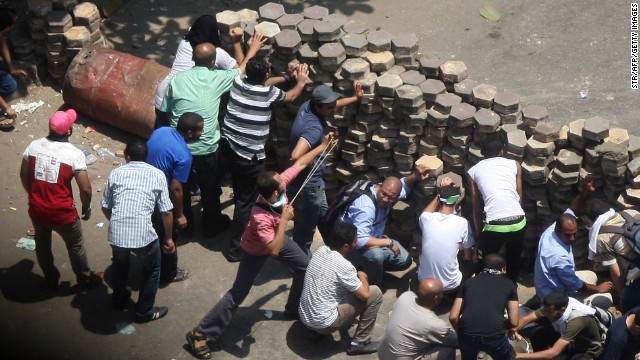 Morsy supporters confront police at Cairo's Mustafa Mahmoud Square on August 14.
Morsy supporters confront police at Cairo's Mustafa Mahmoud Square on August 14. 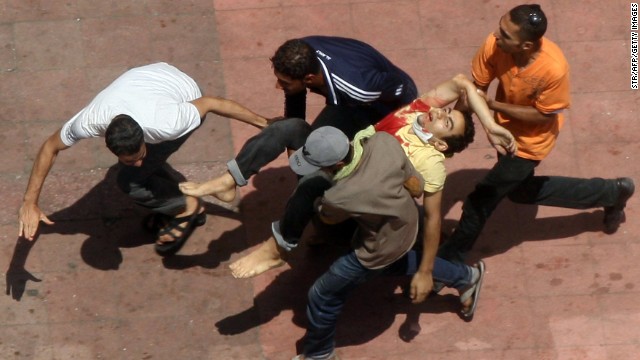 Morsy supporters carry a wounded man during clashes with riot police in Cairo on August 14.
Morsy supporters carry a wounded man during clashes with riot police in Cairo on August 14. 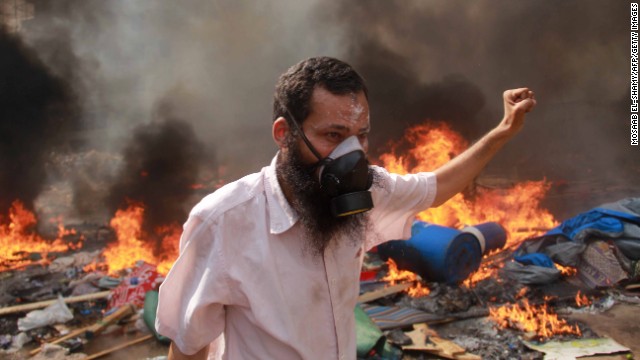 A Morsy supporter during clashes with police in Cairo on August 14.
A Morsy supporter during clashes with police in Cairo on August 14. 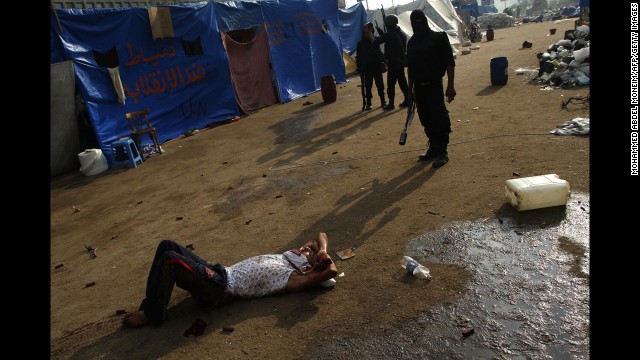 Riot police stand behind a wounded man near Rabaa al-Adawiya mosque in Cairo on August 14.
Riot police stand behind a wounded man near Rabaa al-Adawiya mosque in Cairo on August 14. 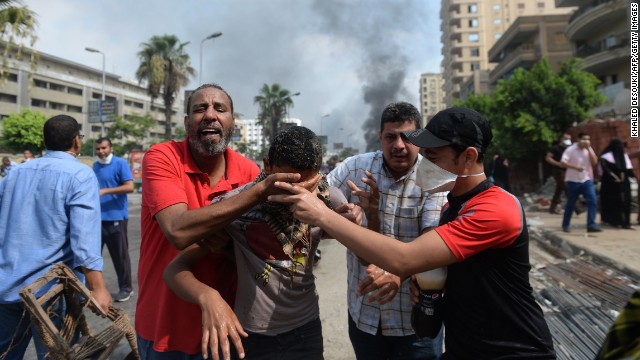 Supporters of Morsy and members of the Muslim Brotherhood run from tear gas as security forces move in at the site of a pro-Morsy sit-in in Cairo on August 14.
Supporters of Morsy and members of the Muslim Brotherhood run from tear gas as security forces move in at the site of a pro-Morsy sit-in in Cairo on August 14. 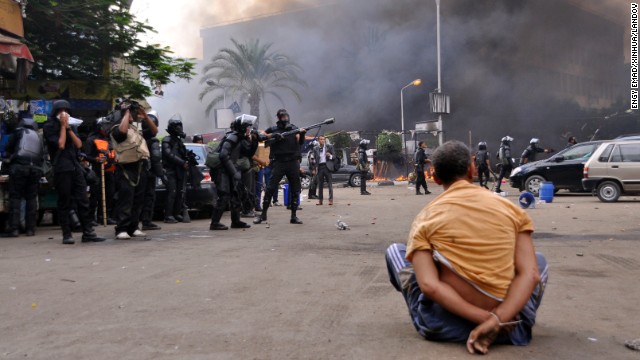 A Morsy supporter sits under arrest at Cairo's Nahda Square on August 14.
A Morsy supporter sits under arrest at Cairo's Nahda Square on August 14. 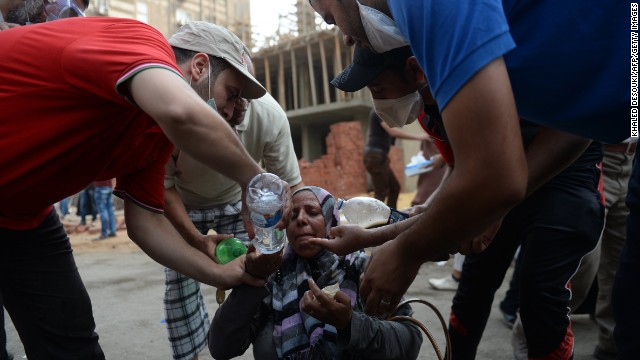 Egyptians help a woman suffering from tear gas exposure in a street leading to Rabaa al-Adawiya mosque in Cairo on August 14.
Egyptians help a woman suffering from tear gas exposure in a street leading to Rabaa al-Adawiya mosque in Cairo on August 14. 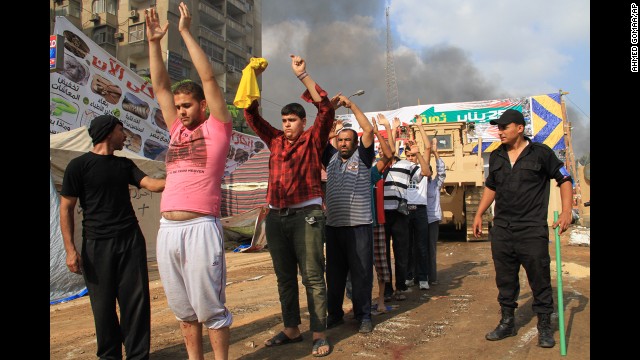 Egyptian security forces detain protesters in Cairo's Nasr City district on August 14.
Egyptian security forces detain protesters in Cairo's Nasr City district on August 14. 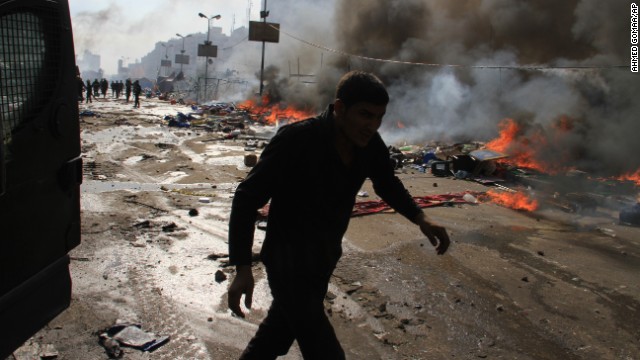 The scene from a street in Cairo's Nasr City appears chaotic as security forces clear a sit-in August 14.
The scene from a street in Cairo's Nasr City appears chaotic as security forces clear a sit-in August 14. 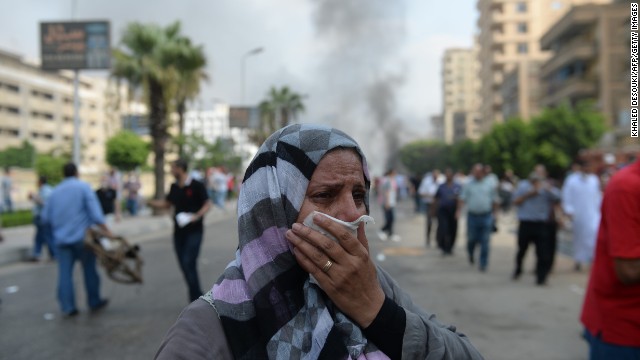 A woman tries to protect herself from tear gas in Cairo on August 14.
A woman tries to protect herself from tear gas in Cairo on August 14. 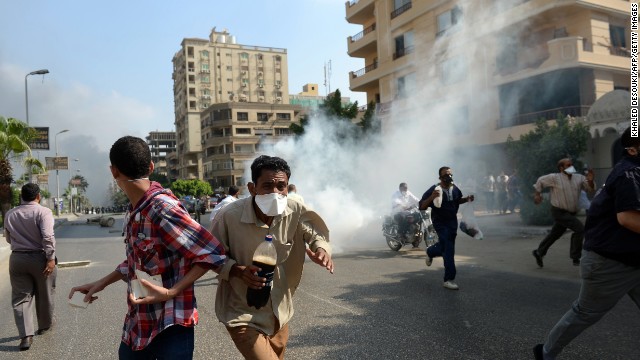 Muslim Brotherhood supporters run from tear gas in a street leading to Rabaa al-Adawiya mosque in Cairo on August 14.
Muslim Brotherhood supporters run from tear gas in a street leading to Rabaa al-Adawiya mosque in Cairo on August 14. 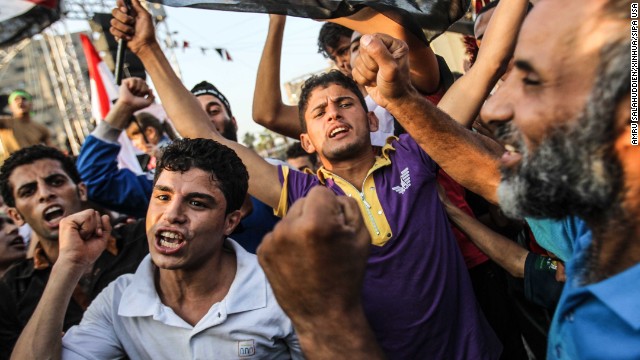 Protesters gather in Cairo's Rabaa al-Adawiya Square on Monday, August 12.
Protesters gather in Cairo's Rabaa al-Adawiya Square on Monday, August 12. 






























































No comments:
Post a Comment